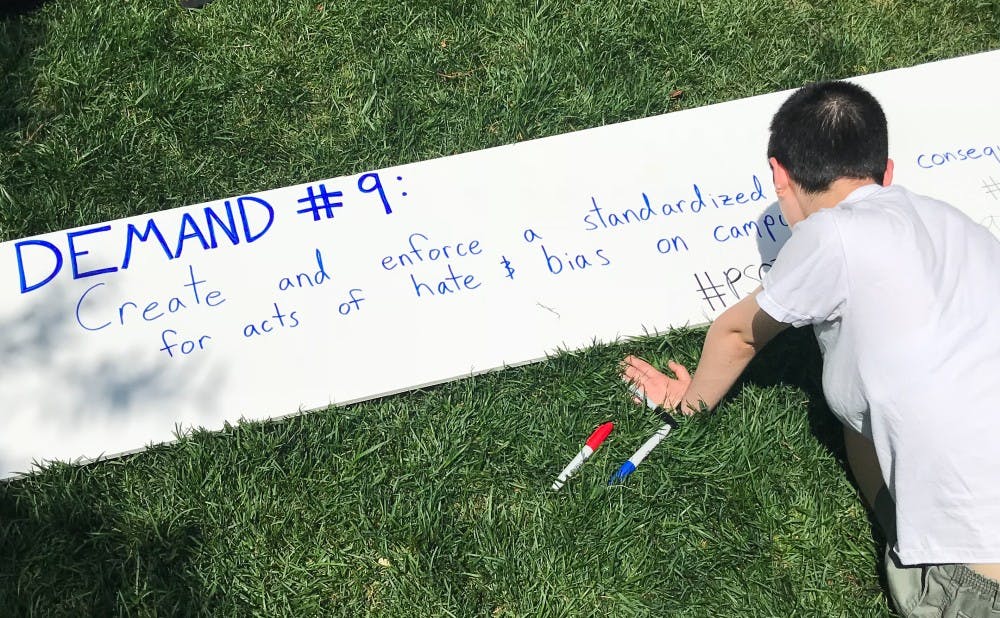In the wake of recent racially charged incidents on campus, students have created a petition that demands Duke create a comprehensive hate and bias policy.
So what policies does Duke already have in place?
On Friday morning, the Duke community learned that a racial slur had been written outside the door of a 300 Swift apartment. This incident came after a student was exposed on the Duke Memes for Gothicc Teens Facebook group for a Snapchat story that also included the word “n*****.” After the Snapchat, Larry Moneta, vice president for student affairs, issued a statement condemning the speech as deplorable.
However, he has received criticism for also saying that the language itself “may not be in violation of any Duke policies on speech and expression” and that “there may not be formal student conduct consequences.”
He drew further criticism for a Friday morning tweet that encouraged students who feel Duke should prohibit hate speech to read a book on free speech by two legal scholars. In the tweet, Moneta also stated “freedom of expression protects the oppressed far more than the oppressors.”
In response, students have circulated a petition asking Duke to "create and enforce a standardized set of consequences for acts of hate and bias on campus,” echoing an earlier demand made by the People’s State of the University group that interrupted President Vincent Price’s speech during alumni weekend. Duke initially announced it might pursue disciplinary action against those students who interrupted the speech, but eventually decided against it.
PSOTU delivered the petition to administrators with more than 600 signatures on Monday.
“Administration cannot pride themselves on 'remembering the past' via racial justice symposiums and celebrations of past student activism, while they repeatedly demonstrate that they are willing to persecute activists today and they have no consequences for racist hate and violence on campus,” the petition states. “Hate and bias incidents are interwoven in the fabric of Duke University, and when the Provost hosts talks on 'Civil Discourse at the University,' minority students are accused of being 'uncivil' when the reality is that they continue to be unsafe.”
What’s in the Duke Community Standard?
The Chronicle went through the Duke Community Standard to see whether there were references to bias and hate incidents on campus. There is no formal reference to hate speech anywhere in the Standard. On pages 55 and 56, the Standard notes that the Office of Student Conduct “responds to violations of student conduct policies that could be bias-/hate-related for all students.”
Incidents based on race may be considered an aggravating factor that could increase sanctions for anyone found responsible for violating the University's policy. This is true for administrative hearings between a student and a hearing officer (page 57) and a finding by the Undergraduate Conduct Board (page 60).
“Should a hearing panel/officer determine at any point during the investigation or adjudication of a violation that a violation was motivated in part or whole by race, color, religion, national origin, disability, veteran status, sexual orientation, gender identity, gender expression, sex, genetic information, or age, the hearing panel/officer may consider this information an aggravating factor that increases the stringency of the sanction(s),” the Standard states.
This provision was added in 2016 and was announced by then-President Richard Brodhead in an Sept. 2016 email to the student body. The change was made pursuant to findings from the Task Force on Bias and Hate Issues from May 2016. That task force was created in Nov. 2015 after a community forum addressing the vandalism of a Black Lives Matter sign and a homophobic slur in an East Campus dorm.
“The university community’s high value on free expression means that speech and behavior should not be sanctioned solely because hate and bias are involved,” the report stated. “If the speech or behavior would be sanctioned under existing university policy, independently of any hate or bias, then the element of hate and bias element should be treated as an aggravating factor for any sanction, as appropriate. There may also be some instances where acts and behaviors violate university policy because hate and bias are involved, and in such select cases, hate and bias may also be treated as the basis for intensifying sanctions.”
The report’s proposed approach suggests that such “existing university policy” includes harassment, defacement of property and disorderly conduct.
It further states that hate or bias speech or incidents such as offensive jokes and insensitive party themes that are not crimes and are not punishable by extant policies “should not be handled as disciplinary cases.”
In the Duke Community Standard:
- Disorderly conduct is defined as either “unreasonable or reckless conduct” that is “inherently or potentially unsafe to other persons or their real or personal property” or “behavior that disrupts the peace or interferes with the normal operation of the University.”
- Harassment is defined as “unwelcome verbal or physical conduct that, because of its severity, pervasiveness and/or persistence, interferes significantly with an individual’s work or education, or adversely affects an individual’s living conditions.”
The initial email about the 300 Swift racial epithet from Janine Weaver-Douglas, associate dean of Central Campus residence life, indicated that the incident was “in direct violation of....the Duke Community Standards.” It did not mention which part of the Duke Community Standard was violated or whether there would be any student conduct action, and no responsible party has been publicly named.
“To be clear, the epithet that was used, and the overall behavior displayed and exhibited are in direct violation of the community standards set forth by Central Campus, Housing and Residence Life, Duke Community Standards, and Duke University, itself,” wrote Weaver-Douglas in the email. “Behavior and action in this vein are unacceptable on this campus.”
Get The Chronicle straight to your inbox
Sign up for our weekly newsletter. Cancel at any time.

